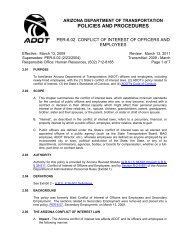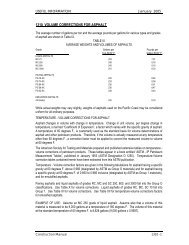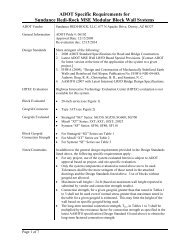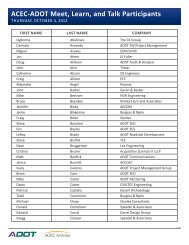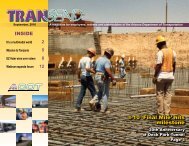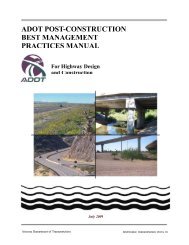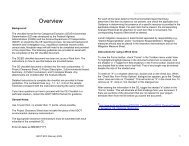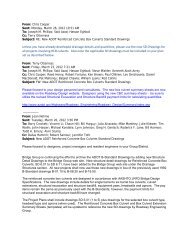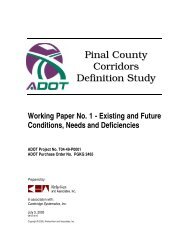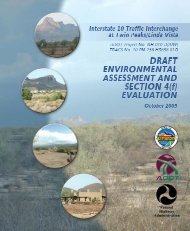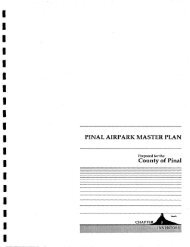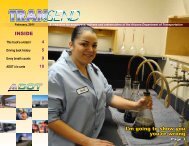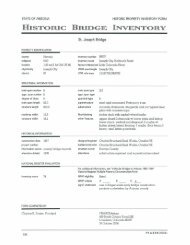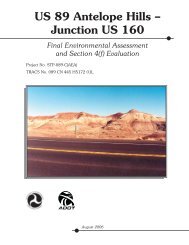ADOT Editorial Style Guide - Arizona Department of Transportation
ADOT Editorial Style Guide - Arizona Department of Transportation
ADOT Editorial Style Guide - Arizona Department of Transportation
Create successful ePaper yourself
Turn your PDF publications into a flip-book with our unique Google optimized e-Paper software.
3. <strong>Editorial</strong> <strong>Style</strong> <strong>Guide</strong> | <strong>Editorial</strong> <strong>Style</strong><br />
first reference, second reference. Most names should not be abbreviated on the first reference. Refer to the 2011 AP <strong>Style</strong>book for<br />
specific instances.<br />
HIGHWAYS. On first reference, use the number with the common/segment name (where applicable) in parentheses: Loop 101 (Agua<br />
Fria Freeway). On second reference, use the common/segment name.<br />
flash flood. Two words.<br />
flat adverbs. Grammatically acceptable, but moderate use: Drive safe!<br />
Flickr. Trademarked spelling for the online community <strong>of</strong> photographers.<br />
floodwater. One word.<br />
floorbeam. One word.<br />
flow line. Two words.<br />
formwork. One word.<br />
foreign words and phrases. Do not use italics for foreign proper nouns: Champs Elysees, Fontana di Trevi. Do not italicize foreign<br />
words that are familiar or common in everyday English: habeas corpus, laissez-faire. Do italicize less-common foreign words: avantgarde,<br />
in medias res.<br />
forego, forgo. To forego means to go before: a foregone conclusion. To forgo means to abstain from: He decided to forgo sugary<br />
drinks during his diet.<br />
Foursquare. Trademarked spelling <strong>of</strong> a location-based service.<br />
forward. Not forwards.<br />
fracture-critical (adj.). Hyphenate.<br />
freeway, highway. Freeways are urban, access-controlled routes. Highways are rural, non-access controlled routes. The two are not<br />
interchangeable.<br />
front line (n.), frontline (adj.). Preferred spellings: The front line in World War II was bloody. The front-line reporter was brave.<br />
full-body scanner. Preferred construction.<br />
G<br />
gas, gases. Preferred spellings.<br />
gay. Used to describe men and women attracted to the same sex, though lesbian is the more common term for women. Preferred over<br />
homosexual except in clinical contexts or references to sexual activity. Include sexual orientation only when it is pertinent to a story, and<br />
avoid references to “sexual preference” or to a gay or alternative “lifestyle.”<br />
gender neutrality and inclusiveness. Use gender-neutral and gender-inclusive language whenever possible. Avoid gender-specific terms<br />
and titles like chairman, policeman, waitress and mankind. Instead, use chair, police <strong>of</strong>ficer, server or people. To avoid gender-specific<br />
pronouns, pluralize the subject: Drivers should check their mirrors regularly (not A driver should check his mirrors regularly).<br />
These practices are generally preferable to using the awkward s/he, his/her and he or she. The antecedent and pronoun should always<br />
agree; therefore, do not use a plural they, their or them to refer to a singular noun.<br />
geographic names. Abbreviate Saint as St. and Mount as Mt. Capitalize common nouns when they form an integral part <strong>of</strong> a proper<br />
name, but lowercase them when they stand alone: Central Avenue, the avenue; the Colorado River, the river. Lowercase common<br />
nouns that are not a part <strong>of</strong> a specific name: the <strong>Arizona</strong> mountains.<br />
<strong>ADOT</strong> <strong>Guide</strong> to editorial standards



